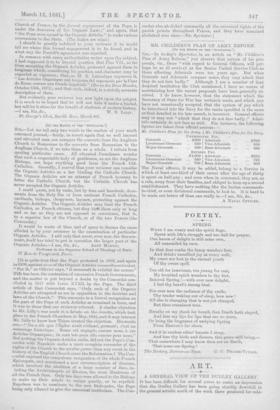MR. CHILDERS'S PLAN OF ARMY REFORM. [To ms EDITOR OF
THE " SPECTATOR.")
Sre,—In to-day's Spectator, in an article on "Mr. Childers's Plan of Army Reform," you observe that certain of his pro- posals, viz„ those "with regard to General Officers, will per- haps be as ill received at the Senior United Service Club as those affecting Admirals were ten years ago. But when Generals and Admirals compare notes, they may admit that they do not fare badly." Although I am a member of that despised institution the Club mentioned, I have no means of ascertaining how the recent proposals have been generally re- ceived. I do know, however, that the statement which the Secretary of State for War has certainly made, and which you have not unnaturally accepted, that the system of pay which he introduced into the Navy for the ranks specified is the same as that detailed in his late speech, is incorrect. General officers may or may not "admit that they do not fare badly ;" Admi- rals certainly do not fare as well. For instance, the following figures are taken from official sources :—
Mr. Childers's Plan for the Army. Mr. Childers's Plan for the Nary. UNEMPLOYED PAY.
Generals 2800 Admirals... ... £766 Lieutenant-Generals „ 650 Vice-Ad m irals 503 Major-Generals ... 500 Rear-Admirals 456
RETIRNI) PAY.
Generals 21,000 Admirals ... „. 2850 Lieutenant-Generals . 860 Vice-Admirals 725 Major-Generals ... 700 Rear-Admirals ...
600 The Naval officers, it may be added, belong to a Service in which at least one-third of their career after the age of thirty is spent on half-pay ; and even when in command, they are, as a rule, away from their families, and obliged to keep up a second establishment. They have nothing like the Indian commands- in-chief, or even divisional commands, to look to. It is hard to be made out better off than one really is.—I am, Sir, &c., A NAVAL OFFICER.


































 Previous page
Previous page